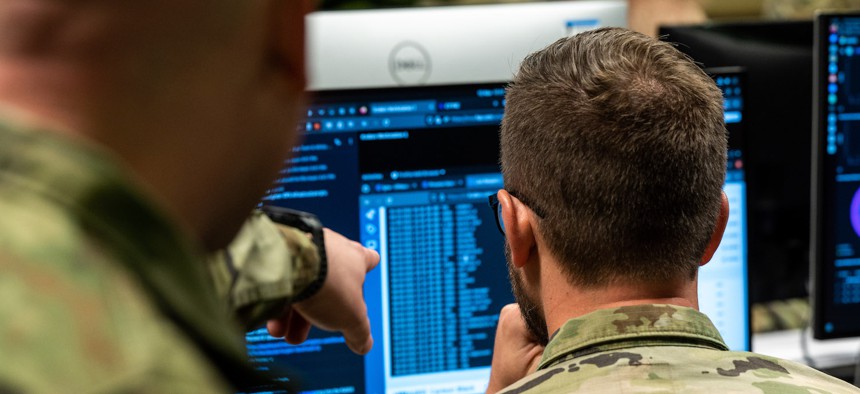The 2024 defense policy bill has a lot of cyber

U.S. Space Force guardians participate in Moonlighter, an exercise designed to focus on refining the defensive and offensive cyber skill sets, in Colorado Springs, Colorado, Nov. 15, 2023. U.S. Space Force / Ethan Johnson
Other provisions touch on diplomacy and nuclear command and control, among other things.
Lawmakers have finalized the must-pass annual defense policy bill that authorizes $874.2 billion for the Pentagon and other national security programs amid fervor from staunch conservatives—and quite a few tech amendments.
The conference report for the 2024 National Defense Authorization Act, released late Wednesday, is more than 3,000 pages long, covering a range of issues from creating a collection of data on unidentified anomalous phenomena in the National Archives to putting limits on the kinds of unmanned aircraft systems the government can buy and operate.
The controversial bill has drawn ire from hard-line Republicans for dropping several conservative measures, including some that would have limited abortion access, restricted gender-affirming health care, and curbed diversity efforts. However, the bill installs hiring freezes and pay caps for diversity-equity-inclusion roles across the Defense Department. There’s also an amendment that creates a four-month extension for Sec. 702, the controversial warrantless surveillance authority intelligence agencies use for foreign targets.
Congress is expected to vote on the bill in the coming weeks, but until then here’s a look at some of the most eye-catching provisions:
Science, tech, and all that cyber
- Cements the Office of Strategic Capital and gives it the power to make loans for certain emerging technologies tied to warfighter needs.
- Tasks the Pentagon with clearly establishing roles and responsibilities needed to manage combined Joint All Domain Command and Control, or JADC2, and requires quarterly briefings to Congress.
- Greenlights countering illegal transnational activity by Mexican criminal organizations in cyberspace.
- Requires U.S. Cyber Command to work with combatant commands to develop cyber support mechanisms to boost capabilities, planning, and prioritize risks specific to a command’s area of responsibility.
- Creates a cross-functional team focused on cyber defense for the networks and systems involved in nuclear command, control, and communications, or NC3. The bill also includes a new major force program for NC3 programs and a budget assessment for fiscal years 2025 through 2030.
- Mandates a unified datalink strategy that would help standardize the technical protocols needed for systems to be interoperable.
- Creates the bureau chief data officer program to improve data fluency.
- Gives the State Department a new chief artificial intelligence officer who can be dual-hatted with their chief data officer. State’s chief information officer also gets more power to be consulted “on all decisions to approve or disapprove significant new unclassified information technology expenditures, including software.”
Other tidbits
- Creates a special inspector general to oversee and investigate claims of waste, fraud, or abuse with U.S. security assistance to Ukraine.
- Demands a complete assessment of the Marine Corps’ Force Design for 2030, including the “extent to which modeling and simulation, experimentation, wargaming, and other analytic methods support the changes incorporated into the modernization initiatives.”
- Requires an audit to see if Defense Department funds have been diverted to Chinese research labs, through grants, contracts, or other types of agreements in the past decade.
- Gives the Navy a rapid capabilities office dedicated to emerging tech in naval aviation, including new weapons and electronic warfare capabilities.
- Names head of Defense Innovation Unit as “principal staff assistant” to the defense secretary.
- Pushes DOD to create a pilot program on advanced explosives, namely the use of the CL-20 compound in weapons systems under development.
- Plus, the bill creates a Joint Energetics Transition Office to develop a strategy for new and legacy energetic materials and technologies.



